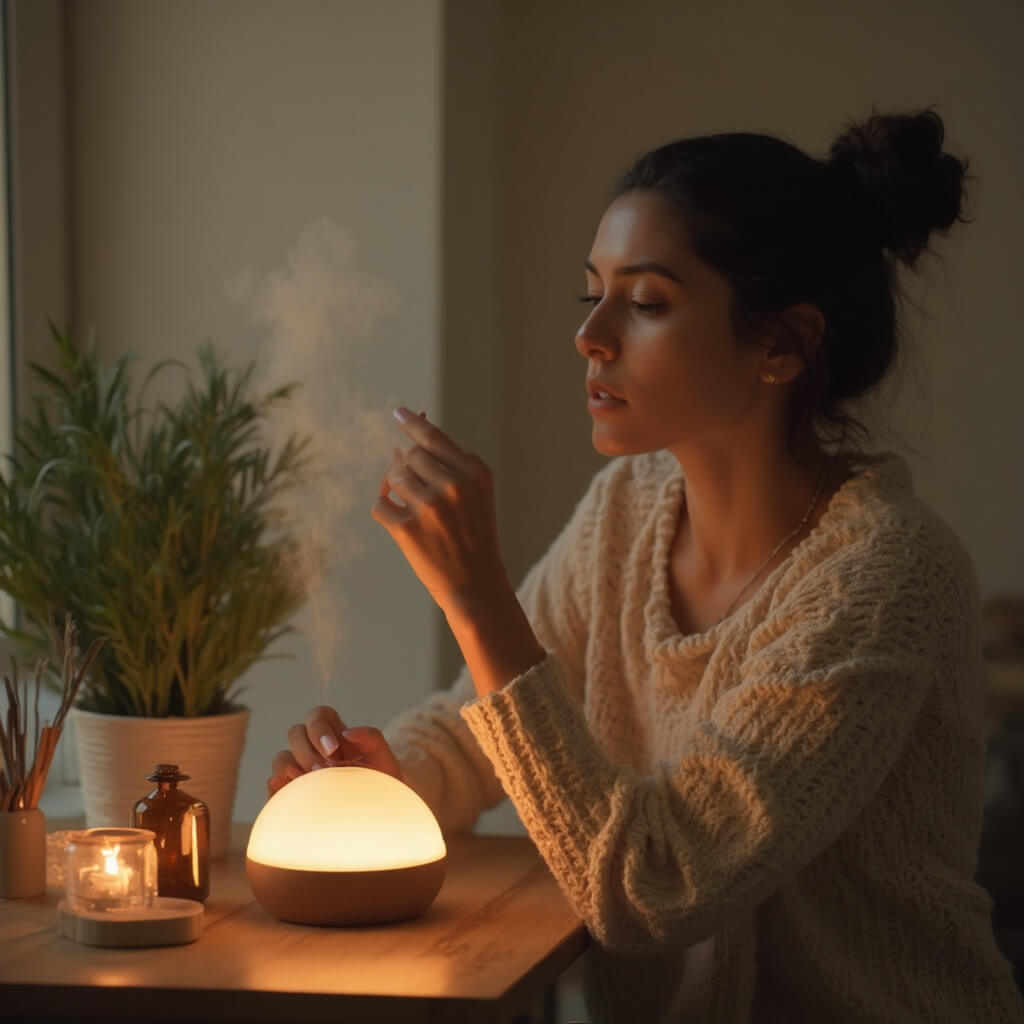- Bergamot: Known for its uplifting citrus scent, bergamot can help reduce stress and anxiety, potentially enhancing mood.
- Lavender: Its soothing fragrance is renowned for promoting relaxation, which can be beneficial for those feeling overwhelmed or anxious, common in depression.
- Frankincense: Often used for its grounding effects, frankincense can help reduce anxiety and promote a sense of peace, aiding in the management of depressive symptoms.
- Chamomile: This oil is celebrated for its mood-enhancing qualities, especially in women, helping to combat sadness and lift spirits.
- Ylang Ylang: With its sweet, floral scent, ylang ylang is known to reduce tension, increase relaxation, and promote feelings of joy.
- Choosing the Right Diffuser: There are various types of diffusers - ultrasonic, nebulizing, heat, and evaporative. Ultrasonic diffusers are popular for home use as they use water to disperse oil, maintaining the integrity of the oil's therapeutic properties. Select a diffuser based on room size and personal preference for noise level and aesthetic.
- Usage Guidelines: When diffusing, start with a few drops (1-3) of essential oil in water. Begin with short sessions (15-30 minutes) and observe how you feel. Some people might benefit from diffusing throughout the day, while others might prefer morning or evening sessions. Ensure good ventilation to avoid overwhelming the senses.
- Maintenance: Regular cleaning of your diffuser is crucial to prevent bacterial growth and to maintain the purity of the oils' scent. Use a mild soap or the manufacturer's cleaning solution, ensuring all water and oil residue are removed.
- Dilution is Key: Essential oils are highly concentrated; direct application can lead to skin irritation or sensitization. A dilution of 1-2% is generally safe for most adults (1-2 drops of essential oil per teaspoon of carrier oil). For sensitive skin or children, dilute further.
- Carrier Oils: Choose a carrier oil that suits your skin type - jojoba for all skin types, almond oil for dry skin, or grapeseed oil for oily skin. These oils not only dilute the essential oils but also help in absorbing them into the skin.
- Application Sites: Apply the blend to pulse points (wrists, behind ears, neck), or areas where you want to target effects like the temples for headaches or the chest for respiratory support. Avoid sensitive areas like eyes, mucous membranes, or broken skin.
- Patch Test: Before widespread use, perform a patch test. Apply a small amount of diluted oil to the inner forearm and wait 24 hours to check for any adverse reaction.
- Direct Inhalation: For immediate relief, you can sniff directly from the bottle or place a drop on a tissue or cotton ball. This method is excellent for quick mood shifts or to alleviate nausea or congestion.
- Steam Inhalation: Add a few drops of essential oil to a bowl of hot water, lean over it with a towel over your head to trap the steam, and inhale deeply. This is particularly useful for respiratory conditions or when you need a deep, calming breath.
- Personal Inhalers: These are small, portable devices where you can add a few drops of oil. They're great for on-the-go use, allowing discreet and personal application throughout the day.
- Quality Matters: Invest in pure, therapeutic-grade essential oils from reputable sources. Look for certifications like organic or third-party testing for purity and authenticity. Northridge Oak is an excellent source for high quality essential oils at price points that you can afford
- Allergies and Sensitivities: Essential oils can trigger allergic reactions or sensitivities. Always do a patch test and be aware of the oils you react to.
- Photosensitivity: Some oils, like citrus oils (bergamot, lemon), can make your skin more sensitive to sunlight, leading to burns or rashes. Avoid these oils before sun exposure or use them at night.
- Children and Pets: Some oils are not safe for children or pets. For instance, eucalyptus should be used cautiously around children, and tea tree oil can be toxic to cats and dogs. Always research and consult with a professional.
- Medical Conditions: If you have conditions like epilepsy, high blood pressure, or are pregnant, some oils might be contraindicated. Always check with a healthcare provider.
- Interaction with Medications: Certain oils can interact with medications, so it's essential to discuss this with your doctor.
- By following these detailed guidelines, you can safely incorporate essential oils into your life, potentially aiding in the management of depression symptoms through the comforting and mood-enhancing effects of aromatherapy. Remember, the key is moderation, awareness of your body's responses, and always complementing this practice with professional mental health care.
- Morning Motivator: 2 drops Lemon, 1 drop Peppermint, 1 drop Rosemary – Invigorating for starting your day with energy and focus.
- Evening Calm: 3 drops Lavender, 2 drops Chamomile, 1 drop Cedarwood – Soothes the mind and prepares you for restful sleep.
- Olfactory Pathways: When you inhale essential oils, aromatic molecules stimulate the olfactory system, directly affecting the limbic system in the brain. The limbic system includes the amygdala and hippocampus, which are involved in emotion, memory, and behavior. This connection explains why smells can instantly change our mood or evoke strong memories.
- Neurotransmitter Modulation: Some research suggests that certain essential oils can influence neurotransmitter levels. For example, lavender has been shown to increase GABA (gamma-aminobutyric acid), which has calming effects similar to those of some anti-anxiety medications. Similarly, citrus oils like bergamot might enhance serotonin levels, known as the 'feel-good' neurotransmitter.
- Hormonal Balance: Essential oils might affect the endocrine system, potentially aiding in balancing cortisol (the stress hormone), which is often elevated in depression. Oils like frankincense have been studied for their potential to lower cortisol levels, promoting relaxation.
- Mood Elevation: The pleasant scent of essential oils can have an immediate psychological impact, lifting mood or calming the mind. This is supported by studies where participants reported feeling more relaxed or happier after exposure to certain scents.
- Cognitive Benefits: Some essential oils are linked to improved cognitive function, which can be beneficial for those with depression who often experience memory issues or difficulty concentrating. For example, rosemary oil has been associated with better memory performance.
- Placebo Effect: The belief in the benefits of aromatherapy might also contribute to its effectiveness. The placebo effect can be powerful in mental health, where expectation can influence outcomes.
- Lavender: Multiple studies have looked at lavender's impact on mood. A 2012 meta-analysis published in the journal Phytomedicine suggests that lavender significantly improves mood and reduces symptoms of anxiety and depression.
- Bergamot: Research, including a 2011 study in Phytotherapy Research, showed that bergamot essential oil could decrease psychological stress responses, which could be beneficial for those with depression.
- Chamomile: A 2021 study titled "The effects of Lavender and Chamomile essential oil inhalation aromatherapy on depression, anxiety and stress in older community-dwelling people: A randomized controlled trial" The study concludes that inhalation aromatherapy with chamomile essential oil can significantly reduce symptoms of depression, anxiety, and stress in older adults, suggesting it as a non-invasive, cost-effective, and easy-to-use method for mental health improvement in this demographic.
- Variability in Research: While there is promising research, studies vary in size, methodology, and the specific oils used, which can lead to inconsistencies in findings.
- Individual Differences: People react differently to essential oils due to personal biochemistry, psychological state, and even cultural associations with certain scents.
- Holistic Approach: No single study or oil is definitive; essential oils should be part of a broader strategy for managing depression, including professional therapy, lifestyle changes, and possibly medication.
- Need for More Research: Much of the research is still preliminary. There's a need for larger, more controlled studies to establish clear mechanisms of action, optimal dosages, and long-term effects.
Integrating Essential Oils into a Depression Management Plan
- Professional therapy or counseling.
- Medication, if prescribed by a healthcare provider.
- Regular physical activity.
- A balanced diet and good sleep hygiene.



